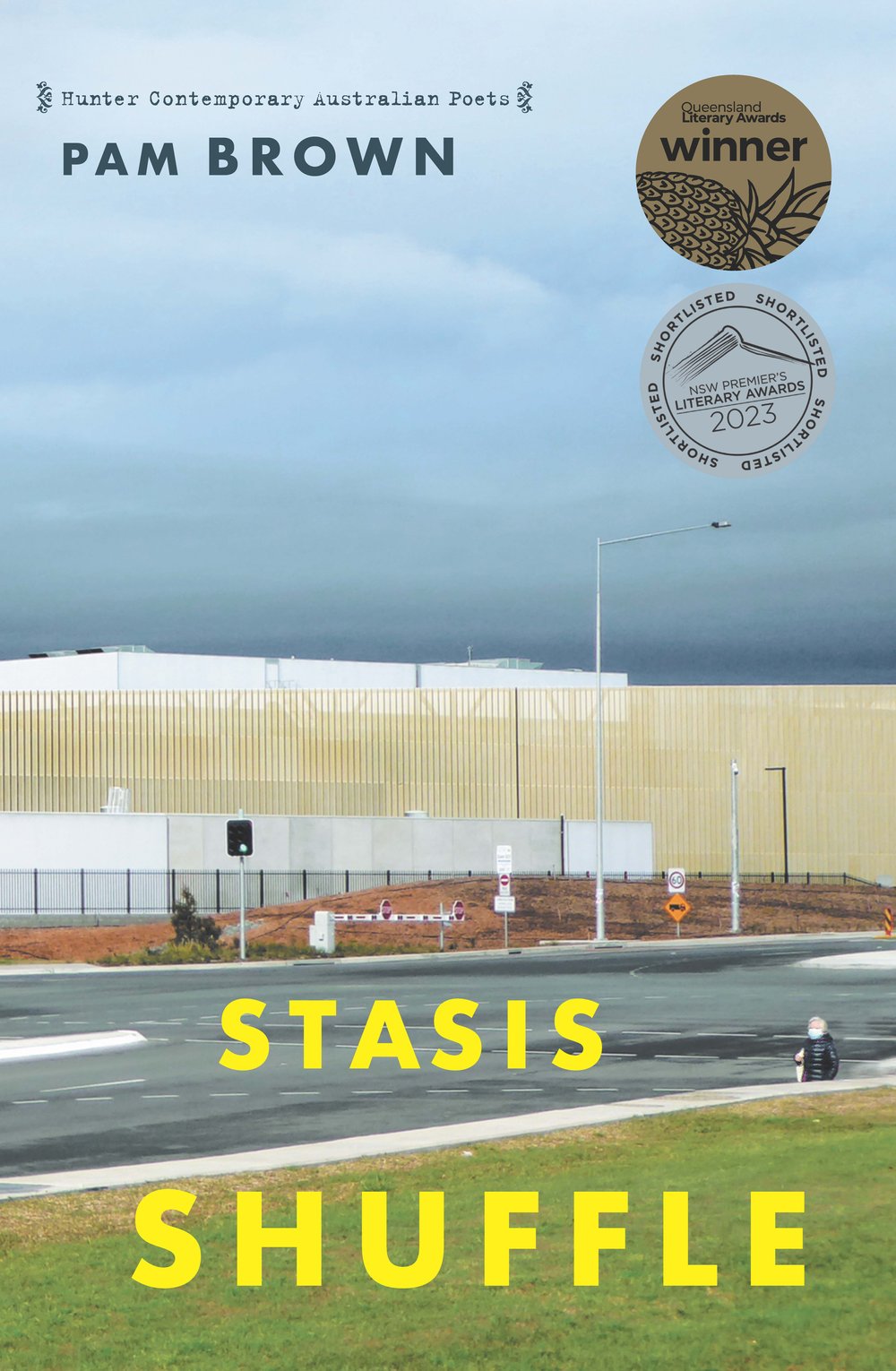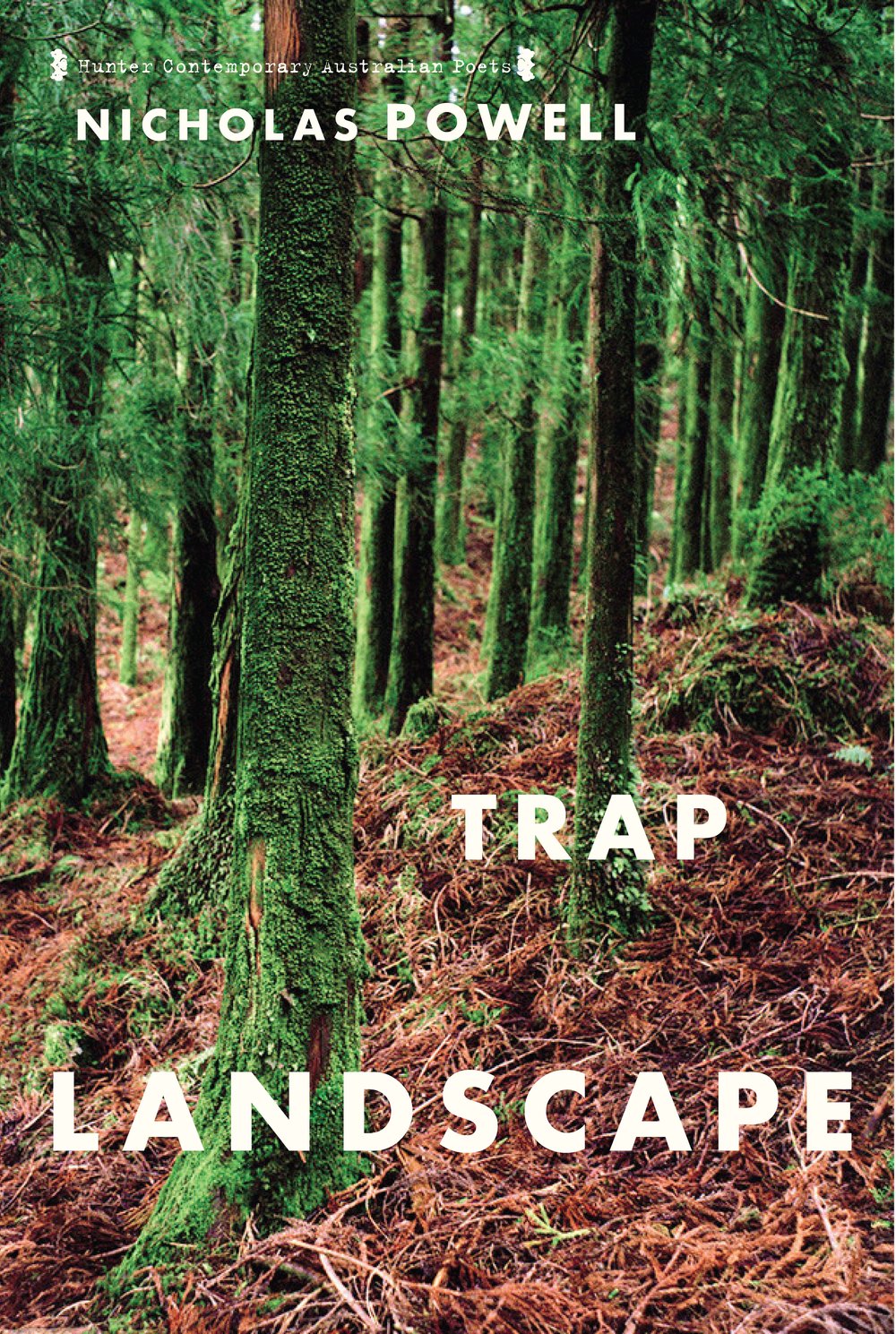
 Stasis Shuffle by Pam Brown
Stasis Shuffle by Pam Brown
Hunter Publishers, 2022
Trap Landscape by Nicholas Powell
Hunter Publishers, 2022
The last poem of Pam Brown’s Stasis Shuffle, ‘(fundamentals)’ begins with the lines: “make a distinction / between imagery / & reality” (103). As much as the distinction in question evokes the verisimilitude of the fake, a need to separate unreliable image from truth, Stasis Shuffle’s interest in reality and authenticity goes deeper. The lines above resonate with the book’s cover, a photo of an urban landscape so carefully constructed that the photo (especially its forward half) might be taken for a planner’s sketch or impression. Myth’s claim to truth has been an important part of Brown’s work, though a focus here is the way the real world comes to relate as something less than authentic.
In ‘(best before)’, Brown writes:
my feeling is
the planet is losing its real
(like
everyone knows)
(11)
Beginning with the personal and possessive, such words imply a primacy of individual expression alongside matters of the planetary and existential. Alternately, if the kinds of things that everyone knows signal resignation, they can do with reiterating. The idea of the real is extended in ‘(last known location)’:
r.i.p
icon
of blankness
embracing
inauthenticity
you will be
missed
(99)
This balances a timely scepticism (“blankness”, “inauthenticity) with an image of misguided reverence, idolatry. It’s the inauthentic in this case with which the world is enamoured. Brown critiques a culture of individualism in ‘(mme nhu)’:
how many eyes
go to the gym
its wall mirrors
colliding
with lust
(34)
And this critique might be considered with the following on ecology, “earthmovers that never said, ‘sorry rhizome’,” if we think of self-sameness as monoculture (14). Together such examples suggest totalising political structures, according to which “the systemic management / of culture” occurs as much from a self-regulatory within, as from a governmental without (20).
Consumerism and digitalisation are presented as cultural forms toward the degraded experience of the real, which in ‘(next time)’ is mediated, literally diluted, juxtaposed to the sensory real of the poem:
you licked a saltbush
out in the scrub –
that’s the photo
that the taste
wasn’t that good
isn’t ‘revealed’
(17)
As with the decontextualising image/photo, the passage
it beggars
belief
that
ipad streaming
was all they did
beneath the campanile
(‘(I can hear your aargh from here)’,44)
ironically engages the diminished status of high culture yet points to the relocation of experience to digital contexts, with the effect that “there’s no history / there’s (only) allegory” (‘(best before)’, 8). It’s here in part, in a context of experiential inauthenticity, that the title Stasis Shuffle gathers meaning, suggesting a recombination of existing elements, perpetual sameness attended by superficial change, production and reproduction, “old […] faking new,” the kind of change implied by the streetscape on the cover (65). Stasis Shuffle’s 2021 publication coincided with COVID-19 shutdowns in Australia and internationally, with their impact on world production, and as much as the title calls to mind an unchanging political reality, it also hints at a welcome stasis, one “liberated / from the drudgery / of usefulness,” as ‘(best before),’ quoting Walter Benjamin, puts it (3). In this perspective
everyone
should just
leave
everything
&
I do mean
every thing
alone
(‘(I can hear your aargh from here)’, 46)
Brown’s work has often questioned poetry’s social efficacy. (See for example ‘susceptibility song’ from 2018’s click here for what we do, and its ambivalence around poetry’s agency for change.) While Brown writes “not a poet for nothing” in ‘(best before),’ the idea of liberation from usefulness alludes to poetry itself as a non-productive activity (4). Untethered from economic or cultural duty, poetry becomes a site where “nobody’s governing” – permissive, potentially anarchic – a sense conveyed in Brown’s tonal ease and delightfully irruptive logic (“eat barking dog”, “drink / your shingles / if all else fails”) (‘(best before)’, 4; ‘(plastic & tragic)’, 27; 27). There’s an air of abandon, a trust in impulse, intuition:
life’s more fun
when you
don’t know
what the hell
you’re doing
(29)
Brown begins the poem ‘Might as well’ from her 2015 collection Missing up with the lines: “born in parenthesis / raised in an interstice” (42); she writes in click here for what we do of “interstitial thinking” (‘Susceptibility song’, 86). As if to consolidate an early conceptualisation of process, Brown parenthesises each of Stasis Shuffle’s poems’ titles – locating the poem at the gaps and apertures of systemic culture, while implying clarification, revision, an imposition of terms and conditions on the otherwise culturally acceptable or legitimate. In this revisionist space Brown can assert a value for poetry. If the phrase “daydreaming […] good for you” in (39) ‘(mme nhu)’ tends to the political, values for poetry are further communicated in ‘(the real)’ (39; 32). The images of Jack Spicer and experimentalism
evil boy genius
jack spicer
desired
a peculiar derangement
of experiment
(32)
critique the masculine, intellectual exceptionalism – a tradition of literary experimentation, and within which Brown herself can be said to write – it’s the ending that’s most interesting:
jack was right
when he said
the imagination
pictures
the real
(33)
The underline highlights a concession, but a conditional, an ironic one, something like a backhanded compliment (he was right, for once). Poetry diminishes myth, as well as poetry’s myth-making (“not every / mundanity makes into a poem”) (‘(looks like)’, 85). But in ‘(the real),’ the rewriting of myth progresses to a truth or ontology (the nexus of imagination and reality) yet caveated by “the imagination” and “pictures,” whose connotations of the dream-like, and cinematic, shadow any transparent idea of the real.
Many of the poems in Stasis Shuffle use the divided shapes and forms for which Brown is well-recognised; there are also some key variations. The stepped lines of ‘(next time)’ and ‘(drinks)’ share a visual likeness with the poems around them. Their enjambment, line-by-line grammar, and reflective parenthesis build, however, to a more firmly cumulative impact. ‘(drinks)’ seems most notable in this sense. Picking up about halfway through, it reads:
kept up, & alert
by an urgent
contingency
& (possible) opportunism
that could be
slowly dismantled
by the friendship machine
or even
(boring perhaps to some)
the very isomorphism
agamben or derrida
or
some other lacanian or other
warned us against
before
we desublimated
into a cool, casual enjoyment
(though not without
emotional labour)
of
too many drinks
(59)
The later section ‘(pressure’s on) six mini double sonnets’ reflects further variation, only whereas ‘(drinks)’ extends the fragment through sustained grammatical impulse, the poems here reduce it. Lines are mostly stand-alone phrases:
memory seafoam hidden expectations keen accomplice no provocation exercise yard ecco runners pressure’s on (72)
There’s the feeling of speed, at odds with or in response to the stasis of the title. Brown writes in ‘(fundamentals),’ “it’s insane it’s fast / it’s fun,” which perhaps sums up the spirit of ‘(pressure’s on)’ (105).
It’s fun but there’s also a keen discipline at work here. In their unstinting documentation of the moment, Brown’s poems read like maps of exemplary (sustained) concentration, both individually, and then together, as a rich and extraordinary oeuvre.













